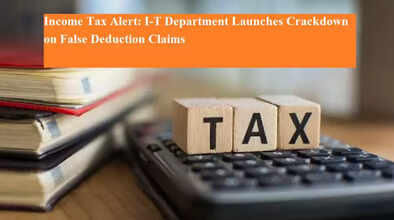Income Tax Alert: I-T Department Launches Crackdown on False Deduction Claims

Think Twice Before Claiming Fake Tax Deductions—You Could Land in Serious Trouble!
The Income Tax Department is tightening its grip on individuals and entities making fraudulent deduction claims in their Income Tax Returns (ITRs). On July 14, the department launched a major operation under multiple sections of the Income Tax Act, targeting those who had claimed fake deductions to evade taxes.
What Happened?
According to reliable sources, the Income Tax Department carried out surprise searches at several locations across India. These raids focused on taxpayers and intermediaries suspected of falsely claiming deductions under various sections of the Income Tax Act—particularly those related to investments, housing loans, education expenses, and other tax-saving instruments.
The move is part of a broader campaign to curb the growing menace of tax evasion through fraudulent means. Officials stated that many individuals are knowingly submitting forged documents or inflated expenses to reduce their tax liability.
What Are Fake Deduction Claims?
A false deduction claim is when a taxpayer mentions deductions in their ITR that they are not actually eligible for, or submits forged documents to support those claims. These can include:
-
Submitting fake rent receipts without actually paying rent
-
Claiming deductions under Section 80C without making actual investments
-
Misreporting home loan interest without having a loan
-
Inflating education expenses or insurance premiums
While these may appear minor or harmless to some, they are considered tax fraud under Indian law.
Legal Consequences
The Income Tax Department has made it clear: there will be zero tolerance for tax fraud. Claiming incorrect deductions can result in:
-
Penalty up to 200% of the tax amount evaded
-
Interest on unpaid taxes
-
Criminal prosecution, including imprisonment under Section 276C of the Income Tax Act
-
Reopening of past returns for reassessment and further scrutiny
This applies not just to individuals, but also to tax consultants, CA firms, and intermediaries assisting in fraudulent claims.
What You Should Do Instead
With the deadline to file ITRs approaching, taxpayers are advised to ensure that all deductions claimed are valid, legitimate, and supported by proper documentation. If you're unsure about any investment or expense eligibility:
-
Consult a certified tax expert or financial advisor
-
Keep all receipts, proof of payment, and investment certificates ready
-
Avoid using shortcuts or third-party help that offers unrealistic refund promises
Digital Scrutiny Is Rising
The government’s increasing reliance on AI-powered analytics and data matching tools means that even small discrepancies in your ITR can now be flagged automatically. The Income Tax Department cross-verifies bank transactions, Form 26AS, AIS, and TIS with what you file. Any mismatch is likely to trigger a notice.
Final Word
While the lure of higher refunds may tempt some taxpayers to inflate or falsify deductions, the risks far outweigh the short-term gain. The Income Tax Department is on high alert and has shown it will not hesitate to take strict action against fraudsters.
Play it safe this tax season—file your return honestly and on time.

